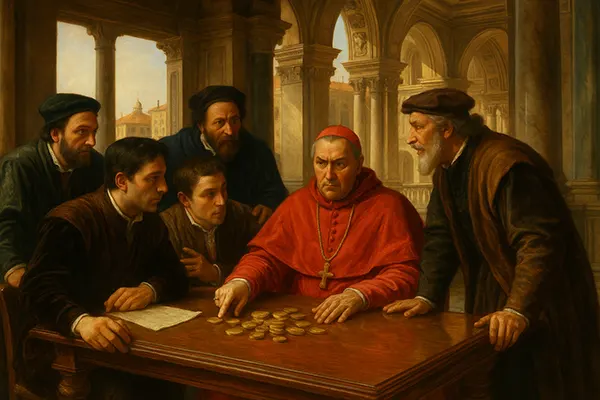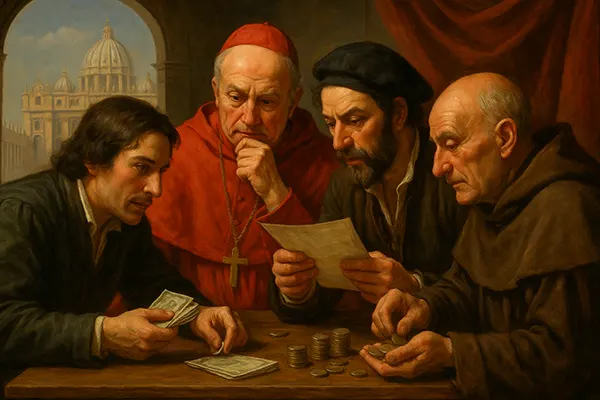In the 15th and 16th centuries, both Venice and Rome became hotspots for an unusual intersection of faith, politics, and risk-taking: betting on papal conclaves. While today political betting is often associated with elections or referendums, in the Renaissance era it centred on one of the most secretive and sacred processes in Europe — the selection of the Pope. This practice, though officially condemned, attracted merchants, diplomats, and even members of the clergy, leading to a fascinating blend of public speculation, insider information, and moral controversy.
Origins of Papal Election Betting
The earliest records of wagers on papal outcomes trace back to mid-15th century Italy, when the papacy held not only religious but also immense political influence across Europe. The conclave was a decisive event, capable of shifting alliances, trade privileges, and even military strategies. As a result, the identity of the future Pope was of deep interest not just to the Church but to political powers and wealthy patrons.
Venice, known for its vibrant merchant culture and intelligence networks, became one of the first hubs for organised betting on papal results. Informal betting circles would form in public squares and merchant halls, where odds were set based on rumours, perceived influence of cardinals, and recent diplomatic moves. The wagers could range from symbolic sums to significant fortunes, and the practice was viewed as a form of political forecasting as much as entertainment.
In Rome, the proximity to the Vatican and the cardinals themselves intensified the phenomenon. Many bets were placed based on whispered conversations, intercepted letters, or even servants’ reports from within conclave preparations. Although technically illegal and frowned upon by the Church, such betting became so widespread that it was an open secret among the Roman elite.
Impact on Political Culture
The betting markets surrounding papal elections inadvertently acted as a barometer for political sentiment. By examining the odds and the favourites, one could gauge which factions within the Church and European courts were gaining influence. Ambassadors often monitored these wagers as an informal intelligence source, reporting back to their rulers about perceived frontrunners.
This activity also reflected the growing public appetite for engaging with political processes, even those shrouded in secrecy. For many participants, betting on the conclave was less about profit and more about being part of the political conversation — a way to assert one’s insight into the shifting power structures of the time.
However, the blending of sacred decision-making with gambling raised moral questions. Critics argued that wagering on the papacy undermined the spiritual sanctity of the election and reduced it to a political sport. Such criticisms foreshadowed later debates on whether political betting compromises democratic integrity.
Insider Information and Controversies
Given the secretive nature of conclaves, accurate information was rare — and therefore incredibly valuable. This scarcity led to the rise of a shadow network of informants: servants, guards, minor clerics, and even cardinals’ relatives. These individuals could feed selective information to bettors willing to pay for it, creating an early form of political “insider trading.”
Venetian diplomats, famed for their intelligence-gathering, often relayed conclave rumours back to their home city, where betting houses adjusted the odds accordingly. In some cases, this information flow was so precise that it pre-empted official announcements by days. Such leaks, while profitable for bettors, infuriated Church officials, who saw them as a violation of conclave secrecy.
One of the most notorious consequences of this was the occasional excommunication of those caught betting, particularly if they were members of the clergy. Yet, despite these severe punishments, the lure of profit and prestige often outweighed the risks for participants.
The Role of Venice and Rome
Venice’s political independence allowed it more leeway in tolerating — and even quietly facilitating — papal betting activities. The city’s ruling elite recognised that such wagers could offer insights into Vatican politics, benefiting its diplomatic strategies. Betting records, when preserved, provided historians with valuable data on shifting alliances.
Rome, meanwhile, remained the epicentre of high-stakes betting due to its proximity to the decision-makers. Wealthy Roman families and foreign ambassadors often engaged in wagers not merely for entertainment but as a demonstration of political alignment. A correctly predicted papal outcome could enhance a diplomat’s reputation as a skilled observer of Church politics.
This geographical division between Venice’s organised betting culture and Rome’s insider-driven markets created two distinct yet interconnected hubs of political speculation in Renaissance Italy.

Legacy and Historical Significance
Although the Church eventually cracked down harder on betting during papal elections, the phenomenon left a lasting imprint on both political culture and the history of gambling. The Renaissance era’s conclave wagers demonstrated how public speculation can shape — and be shaped by — political events, even when access to information is restricted.
The papal betting markets also provided one of the earliest examples of predictive modelling in politics. Much like modern bookmakers adjust odds based on polls and news events, Renaissance bettors used fragmented intelligence and shifting alliances to refine their predictions. This made them, in essence, pioneers of political forecasting.
By the late 16th century, the practice had largely retreated underground due to stricter Church enforcement. Yet, its legacy persisted in other forms of political wagering, influencing betting practices in European courts and beyond.
From Renaissance Wagers to Modern Political Betting
Today’s political betting markets, whether in the context of general elections or leadership contests, owe a subtle debt to these early Venetian and Roman practices. The fundamental principles remain the same: speculation based on incomplete information, the influence of insider knowledge, and the intertwining of politics with financial stakes.
In academic circles, the study of papal betting has become a niche but insightful field, illustrating how gambling can intersect with political history. The detailed records preserved in some Venetian archives offer rare glimpses into the mechanics of Renaissance-era political forecasting.
Ultimately, the story of betting on papal elections reminds us that human curiosity about power transitions — and the willingness to stake something on them — is centuries old. In both the 16th century and the 21st, the intersection of politics, risk, and reward continues to capture the public imagination.

